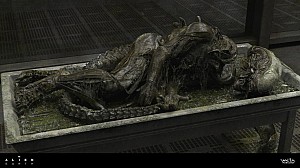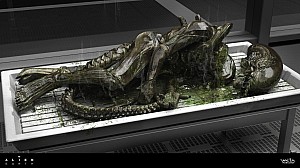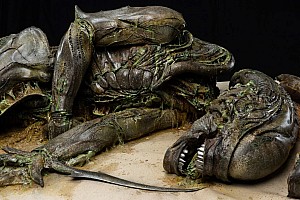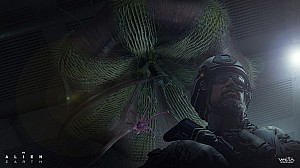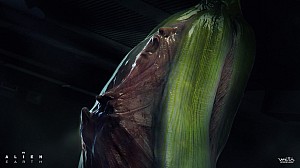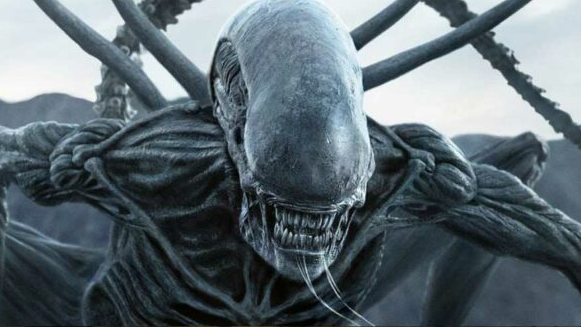Fresh from his work on "The Warriors," producer Walter Hill Discusses his role in the making of "Alien". By Bob Martin.

Alien is not the initial excursion into the worlds of fantasy for co-producer Walter Hill. He also scripted and directed The Warriors, the controversial film that is still drawing crowds at the box office after four months in general release. In answer to charges levelled by some social critics, claiming that the film has caused a resurgence in gang violence in America, Hill points out that it was never intended as anything other than an action-oriented adventure fantasy. "My whole intention in making the Warriors was to create a comic book on film," Says Hill. "The characters and the action are derived from that concept. The violence is extremely stylised and bloodless. And I was especially surprised that none of the press picked up on its elements of self-parody. The audiences always get this right away, but solemn pontificators of the press have struck it with this label of 'gang movie' and can't see beyond it."
If the press could not see the fantasy elements in the Warriors, Alien should present less of a problem, since it offers spacecraft and the cosmos in place of subways and New York City. Alien is produced by Hill in cooperation with David Giler and Gordon Carroll, his partners in Brandywine Productions. Beyond their billing as co-producers, Giler and Hill had a greater hand in making the film than the credits will show -- though Dan O' Bannon is given sole credit for the screenplay, Giler and Hill adapted his material for the final shooting script. As reported in last month's STARLOG, O' Bannon brought the screenplay credits before the Writer's Guild arbitration panel in an effort to have Hill and giler's names dropped. As it turns out, O' Bannon was successful in that effort.
Comments Hill: "I've made the statement before that on-screen credits often have very little relation to who did what on a film. In this instance, the Writer's Guild has a rule whereby, in a case like this, you have to show that 70 percent of the material was your own and brand new in kind. The fact that David and I carried the O' Bannon screenplay through five drafts to the final shooting script is immaterial. And of course, these things are very difficult to quantify."
"One thing worth remembering is that Dan's screenplay had been making the rounds for quite a bit while no one had bought it. Fox had seen it, and with Dan's original conception of a low-budget picture, they really weren't about to consider it. I originally read the script in the summer of 1976, and I saw qualities in it that the studios hadn't, in terms of the story itself. I presented it to my partners, saying that, if it were done on a sophisticated level, rather than as a low-budget picture along the lines of The Blob, we'd have a truly extraordinary film."
"The real genius of the O' Bannon - Ron Shussett story was that they has worked out the details and plot twists for this story of a space monster that could not be killed without endangering the astronauts, this terrible beast is knocking them off one by one, Agatha Christie's style -- the stuff of real drama."
Hill freely admits having little background in science fiction, though he developed a passion for films of all kinds during his childhood in Long Beach, California. He began to plan for a career in film while a student at Michigan State University. After his graduation, he worked in a number of unrelated fields, including years spent as an oil field worker and on a construction crew, while he completed his first screenplay. The script, though never produced, led to his first work in films. As a young screenwriter, he worked with such notables as Sam Peckinpah (The Getaway) and John Huston (The Macintosh Man) before he directed his first film, Hard Times, starring Charles Bronson. It was shortly afterwards after the completion of Hard Times that O' Bannon's Alien script first caught his attention.
"Fox was notably sceptical when we brought it to them. it's much more difficult for a studio to see the value in this sort of thing than in, for instance, a story about a housewife having a nervous breakdown. After David and I reworked it, they were more able to see the story's merits -- enough to invest $10 million in it."
Originally it was expected that Hill would direct the film, but his commitment to The Warriors prevented it. David Giler recommended Ridley Scott as director after seeing his first feature film, The Duelists. paramount Pictures obligingly arranged screenings for the Brandywine partners. It was Scott's flair for dramatic visuals that convinced the producers that they had found their man.
"Scott is a graphic artist himself," Says Hill, "and executed a full storyboard for the film. Most of the film's visual concepts originated with him. For instance, in designing the space suits, it was Scott's idea to adapt the design of Samurai suits of armour. He gave his own sketch to Jean Giraud, who then used his own personal style in interpreting Ridley's concept. Of course, H R Giger was another major influence on the look of the film."
Both Dan O' Bannon and Ron Cobb have been quoted as saying that the producers were opposed to their idea of hiring Giger. According to Hill, Giger was not initially approached because Fox had not at the time set a budget, and a director had not yet been selected. As it was, a lot of costly pre-production work was abandoned when Scott came in and revised the film's visual approach.
"Originally, O' Bannon wanted Giger for a more limited purpose. His original script had the Nostromo's crew discover a huge pyramid on the alien planet -- Dan was deeply into pyramidology at the time. At the base of the pyramid, they would find an inscription, and that's what Dan felt Giger should have designed. At that point, the monster was planned as a squid-like creature. The visual conceptions of the alien and its planet that is used in the film were jointly developed by Giger and Ridley."
Whatever the source of the creative ideas behind Alien, one thing is sure; people like O' Bannon and Cobb, who previously worked together on Dark Star, Star Wars and an Ill-fated production of Dune, have a knowledge of science fiction, and a loyalty to the SF audience, that is rare in Hollywood. Though all the movies might be considered "fantasies" of one sort or another, for Walter Hill, Alien territory, however, successful it proves to be.

David Giler: Cinefantastique Interview
David Giler, who wrote scripts for MYRA BRECKINRIDGE, THE PARALLAX VIEW and FUN WITH DICK AND JANE, always seemed to get his office located down the h...

David Giler Alien 3 Starburst Special Interview October 1992
Alien 3 screenwriter David Giler guides us on the terrifying journey from script to screen. Why was there a third Alien movie? What were all the re-wr...

Did Alien 3 rip-off The Element of Crime?
In 1984, Danish filmmaker Lars von Trier (Melancholia, Dogville) began his directorial career with The Element of Crime, his first feature film. ...



